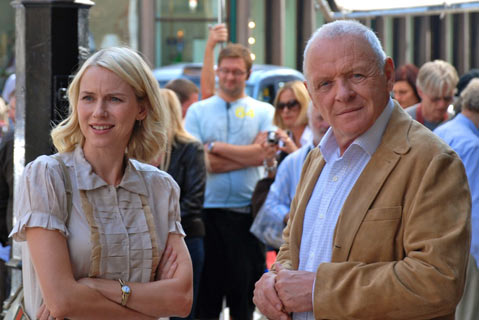You Will Meet a Tall Dark Stranger
Woody Allen’s Latest Misses More Than It Hits

In You Will Meet a Tall Dark Stranger, this year’s model of a Woody Allen film—and they really do arrive in theaters with an uncommon, nearly annual regularity—Roy, a frustrated writer played by Josh Brolin, struggles to finally finish a novel that will break the curse of his being a “flash in the pan” after a promising first novel. Desperate, disheveled, and strained in his marriage to Sally (Naomi Watts), he seeks out a muse, in the neighborly flesh, and connives a devilish plot to wow the world again, one of many morally dubious turns in the film’s thick-plotted and sometimes melodramatic maze of a tale.
As an artist himself, Allen’s own creative pattern is completely different than Roy’s blocked-artist type. Allen doesn’t wait around for the muse, has several very good to possibly-verging-on-great movies in his heaping filmography, and a fiendish work ethic. He has cranked out film after film, comedy after tragedy after mystery after mildly experimental anomaly, for going on 40 years. And sometimes, as in this entertaining but unfinished and wayward mess, it seems that, frustrated by his inability to find a satisfying artistic whole, he prematurely calls it a wrap in order to get on to next year’s project.
After several films made across the drink (including the memorable Match Point and Vicky Cristina Barcelona) and returning to N.Y.C. for last year’s comically cynical pity party Whatever Works, Allen goes transatlantic again this time, basing his multi-character story in London. Using his distancing, Greek chorus-esque method of telling a story as if it’s a parable, the premise involves a late-life crisis man (Anthony Hopkins) falling for a ditzy, busty gold digger, while his rudderless ex-wife (Gemma Jones) falls under a Scotch-dispensing fortune teller’s spell. Meanwhile, her daughter (Watts) grapples with her own life vertigo and carnal temptations. Other subplots, chronological jigsaw moves and twists of fate mix into the story, a plot that keeps thickening to a fault, but never adds up to any coherent point or resolution, except to glibly quote Shakespeare, re: “sound and fury, signifying nothing.” A self-fulfilling prophecy, perhaps.
All the same, as in most Allen films—even the feckless ones—there is plenty to admire along the way, including watching fine actors like Watts and Brolin at work, and Vilmos Zsigmond’s seamless cinematography. But by film’s end, we wonder what just happened, and why. In Allen’s world, we can forgive his misses, because the hits always seem to be around the corner. There is always next year.



